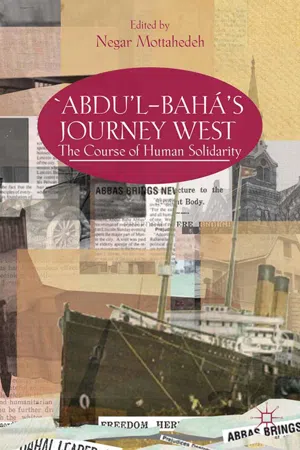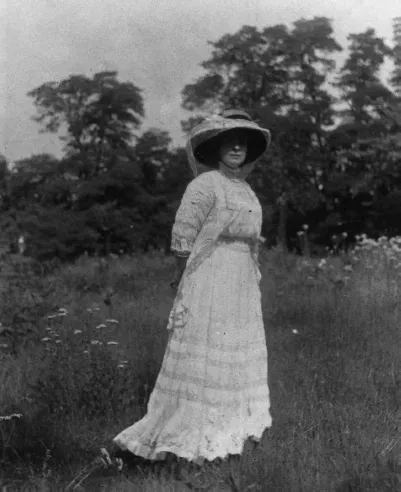
This is a test
- English
- ePUB (mobile friendly)
- Available on iOS & Android
eBook - ePub
Book details
Book preview
Table of contents
Citations
About This Book
This edited volume of specially commissioned essays written for the anniversary of `Abdu'l-Baha's journey to America tells the story of this former prisoner's interactions with the white upper echelon of American society as well as his impact on the lives and writings of important early figures in the African-American civil rights movement.
Frequently asked questions
At the moment all of our mobile-responsive ePub books are available to download via the app. Most of our PDFs are also available to download and we're working on making the final remaining ones downloadable now. Learn more here.
Both plans give you full access to the library and all of Perlego’s features. The only differences are the price and subscription period: With the annual plan you’ll save around 30% compared to 12 months on the monthly plan.
We are an online textbook subscription service, where you can get access to an entire online library for less than the price of a single book per month. With over 1 million books across 1000+ topics, we’ve got you covered! Learn more here.
Look out for the read-aloud symbol on your next book to see if you can listen to it. The read-aloud tool reads text aloud for you, highlighting the text as it is being read. You can pause it, speed it up and slow it down. Learn more here.
Yes, you can access 'Abdu'l-Bahá's Journey West by N. Mottahedeh in PDF and/or ePUB format, as well as other popular books in Storia & Storia mediorientale. We have over one million books available in our catalogue for you to explore.
Information
Topic
StoriaSubtopic
Storia mediorientaleCHAPTER 1
LAURA DREYFUS-BARNEY AND `ABDU’L-BAHÁ’S VISIT TO THE WEST
Mona Khademi
Introduction
Around the turn of the twentieth century, several Western women of prominence journeyed to Acre, Palestine, to visit Abbas Effendi—known as `Abdu’l-Bahá, a spiritual leader born in Persia and the son of the prophet-founder of the Bahá’í Faith, Bahá’u’lláh.1 After Bahá’u’lláh’s passing in 1892 and according to his Will and Testament, `Abdu’l-Bahá was appointed as his successor, the head of the Bahá’í Faith, and the authorized interpreter of his father’s writings. `Abdu’l-Bahá had been exiled and imprisoned with Bahá’u’lláh and the rest of his family in the Ottoman Empire from 1853 to 1908. He was still a prisoner in Ottoman Palestine when the first Bahá’í pilgrims from the Western world arrived. Most of the women became devotees and active promoters of his teachings. They were from the United States, the British Isles, and France.
The first pilgrimage by a group of Western believers in 1898 was spearheaded by Phoebe Hearst, the philanthropist and mother of the newspaper magnate William Randolph Hearst. She was joined in Paris by several others.2 Among the women who accompanied her were: her friend Louisa (Lua) Getsinger, Ella Goodall Cooper of California, May Ellis Bolles (later Maxwell) from New Jersey living in Paris at the time, Mary Thornburgh-Cropper of London and her mother, Harriett Burtis Thornburgh both from California, but residing in England. There were some other women who traveled during the next several years, these included: Laura Dreyfus-Barney from Ohio living in Paris (see figure 1.1); American artist Juliet Thompson; Agnes Parsons, a Washington, D.C. society matron; Ethel Rosenberg, the first English Bahá’í woman; Corinne True of Chicago; and Lady Sara Blomfield of Ireland.3 When `Abdu’l-Bahá visited the West between 1911 and 1913, many of these women hosted him, traveled to different cities to see him and organized meetings and gatherings for him.4
They played an important role in `Abdu’l-Bahá’s visit to the West. It was because of the social position of some of these women that `Abdu’l-Bahá was introduced to “politicians, artists, writers and poets, professors, and other leaders of thought.”5 He gave his addresses at churches, synagogues, cathedrals, philosophical societies, clubs, and private homes. But despite their social positions and wealth, he refused to accept financial help from any of them. There are stories of how he rejected checks and donations from them and that he paid for all his expenses.6 He stayed principally at rented apartments or hotels during his trips.7 But it was through their efforts, their welcoming attitudes, and their subsequent activities that significant aspects of his teachings established roots in the West.

Figure 1.1 Laura Alice Clifford Barney, 1909.
Source: National Bahá’í Archives, United States.
Among `Abdu’l-Bahá’s many female devotees, the American-born Laura Dreyfus-Barney had the most significant role.8 She hosted `Abdu’l-Bahá in Paris and later assisted him during his visit in the United States. Laura Dreyfus-Barney compiled and published one volume of `Abdu’l-Bahá’s explanations of the Bahá’í teachings, which later became part of sacred Bahá’í scripture. She may have even been the first Western Bahá’í woman to have learned Persian.9 She was definitively the first Western Bahá’í woman to have visited Iran, Bahá’u’lláh’s birthplace, at the request of `Abdu’l-Bahá.10 Not only was Laura Barney active in her Bahá’í endeavors, but she was also active in the work of diverse international humanitarian organizations and philanthropic activities such as those connected with the League of Nations and the United Nations.
This chapter discusses Laura Barney’s childhood and family. It explains how she became a Bahá’í, and finally examines her role in `Abdu’l-Bahá’s visits to the West, their effects and importance.
Who Is Laura Clifford Barney?
Laura Alice Clifford Barney was born in 1879 to a wealthy family of industrialists in Ohio. Her mother, Alice Pike Barney was an artist, writer, theater director, philanthropist, and prominent civic and social leader. She was headstrong and eclectic, and people around her at the time often called her “eccentric.”11 Laura’s father was Albert Clifford Barney, a manufacturer and financier. Albert and Alice were married in 1876 and their first daughter, Natalie, was born that same year. Laura was born three years later. The sisters were accustomed to luxury from the earliest years of their life and enjoyed a rich and privileged childhood.12 They were opposites in personality and character.13 Natalie was fearless and rebellious. According to one of her biographers, Suzanne Rodriguez, she “was extremely charismatic, while Laura was shy, quiet and serious-minded.”14 Laura was obedient, a diligent student who always tried to improve. The sisters were sent to Les Ruches, a private boarding school near Paris, at an early age. When they returned to America in 1892, Laura entered Visitation, a Catholic convent school in Washington.15 Even in her youth...
Table of contents
- Cover
- Title Page
- Introduction
- 1. Laura Dreyfus-Barney and `Abdu’l-Bahá’s Visit to the West
- 2. An Analysis of `Abdu’l-Bahá’s Visit to North America in 1912
- 3. `Abdu’l-Bahá’s Critique of Nationalist Amnesia
- 4. A Troubled Modernity: W. E. B Du Bois, “The Black Church,” and the Problem of Causality
- 5. `Abdu’l-Bahá’s 1912 Howard University Speech: A Civil War Myth for Interracial Emancipation
- 6. Orientals Meeting in the West: Foes Become Friends
- Bibliography
- Notes on Contributors
- Index